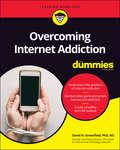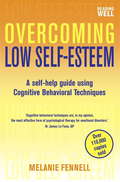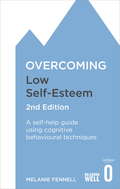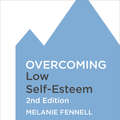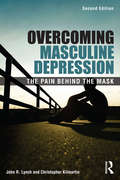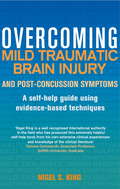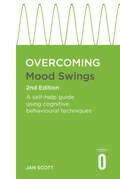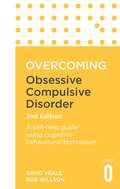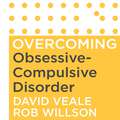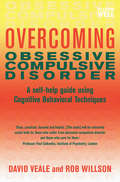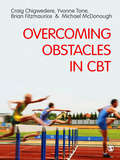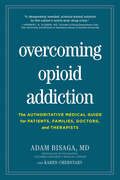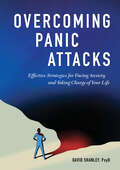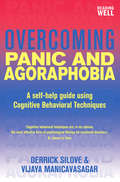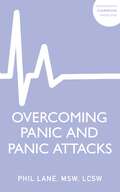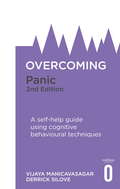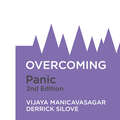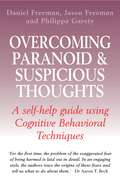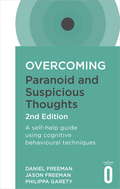- Table View
- List View
Overcoming Internet Addiction For Dummies
by David N. GreenfieldA guidebook to beating internet addiction and screen overuse and for living a fuller life There’s no escaping it―we live in a digital world. We work, play, socialize, and learn online, and the Internet provides many amazing opportunities. Unfortunately, because of our basic biology, we’re all susceptible to overuse and addiction to screens. Video games, social media, porn, and even scrolling online, taps into that pleasurable dopamine reward system. So, when is it time to log off or put the phone down and get help? Overcoming Internet Addiction For Dummies gives you the information, resources, and the self-assessment tools you need to discover how much is too much, along with practical suggestions on what to do about it. Learn how to take back control of your time and attention—or help your kids or loved ones get control of theirs. This comprehensive, user-friendly overview of Internet addiction is full of helpful and proven methods to help foster a healthy, balanced, and sustainable life with screens. Discover the basic biology of addiction, including why children and teens are especially susceptible. Become aware of the cognitive, psychological, and physical effects excess Internet and screen use. Learn how social media, video gaming, and Internet pornography could be getting in the way of real-time living. Find out why smartphones are not smart for you to use all the time. Understand the science of how and why you can become addicted to your screens so you can unplug more easily and use your time for what matters most. Empower yourself and your children to build a positive relationship with the Internet and digital technology. This book can help you and your loved ones plug back into life and show you where you can find information, resources, support, and treatment. Overcoming Internet Addiction is about taking back control of your time and attention and learning to manage your screen use, so it doesn’t manage you.
Overcoming Learning Disabilities
by Natalia M. Pylaeva Tatiana V. AkhutinaBased on the ideas of Russian psychologists Lev Vygotsky and Alexander Luria, this book explores methods of preventing or overcoming learning disabilities. Tatiana V. Akhutina and Natalia M. Pylaeva follow Vygotsky and Luria's sociocultural theory and their principle of a systemic structure and dynamic organization of higher mental functions, and build on their theoretical foundation by focusing on the interactive scaffolding of the weak components of the child's functional systems, the transition from joint child-adult co-actions, and the emotional involvement of the child. The authors discuss effective methods of remediation of attention, executive functions (working memory and cognitive control), and spatial and visual-verbal functions. Overcoming Learning Disabilities translates complex problems into easily understandable concepts that will be appreciated by school psychologists, special and general education teachers, and parents of children with learning disabilities.
Overcoming Low Self-Esteem, 1st Edition: A Self-Help Guide Using Cognitive Behavioral Techniques
by Dr Melanie FennellOvercoming app now available via iTunes and the Google Play Store.A Books on Prescription TitleBoost your confidence and change your life for the betterMelanie Fennell's acclaimed self-help guide will help you to understand your low self-esteem and, armed with this knowledge, break out of the vicious circle of negative self-image, learning the art of self-acceptance and altering your life for the better. Explains the nature of low self-esteem and self-destructive thinkingDescribes what keeps low self-esteem goingExplores how to identify your positive qualities and gain a more balanced view of yourselfContains a complete self-help program and monitoring sheetsBased on clinically proven techniques of cognitive behavioural therapy
Overcoming Low Self-Esteem, 2nd Edition: A self-help guide using cognitive behavioural techniques
by Dr Melanie FennellOvercoming app now available via iTunes and the Google Play Store.'A thoroughly enjoyable read, and [I] would recommend trainee therapists read it also, as it will increase your understanding of the treatment of low self-esteem.' BABCP MagazineLow self-esteem can make life difficult in all sorts of ways. It can make you anxious and unhappy, tormented by doubts and self-critical thoughts. It can get in the way of feeling at ease with other people and stop you from leading the life you want to lead. It makes it hard to value and appreciate yourself in the same way you would another person you care about. Melanie Fennell's acclaimed and bestselling self-help guide will help you to understand your low self-esteem and break out of the vicious circle of distress, unhelpful behaviour and self-destructive thinking. Using practical techniques from Cognitive Behavioural Therapy (CBT), this book will help you learn the art of self-acceptance and so transform your sense of yourself for the better.Specifically, you will learn: How low self-esteem develops and what keeps it going How to question your negative thoughts and the attitudes that underlie them How to identify your strengths and good qualities for a more balanced, kindly view of yourselfOvercoming self-help guides use clinically proven techniques to treat long-standing and disabling conditions, both psychological and physical. Many guides in the Overcoming series are recommended under the Reading Well Books on Prescription scheme.
Overcoming Low Self-Esteem, 2nd Edition: A self-help guide using cognitive behavioural techniques (Overcoming Books)
by Dr Melanie FennellOvercoming app now available via iTunes and the Google Play Store.'A thoroughly enjoyable read, and [I] would recommend trainee therapists read it also, as it will increase your understanding of the treatment of low self-esteem.' BABCP MagazineLow self-esteem can make life difficult in all sorts of ways. It can make you anxious and unhappy, tormented by doubts and self-critical thoughts. It can get in the way of feeling at ease with other people and stop you from leading the life you want to lead. It makes it hard to value and appreciate yourself in the same way you would another person you care about. Melanie Fennell's acclaimed and bestselling self-help guide will help you to understand your low self-esteem and break out of the vicious circle of distress, unhelpful behaviour and self-destructive thinking. Using practical techniques from Cognitive Behavioural Therapy (CBT), this book will help you learn the art of self-acceptance and so transform your sense of yourself for the better.Specifically, you will learn: How low self-esteem develops and what keeps it going How to question your negative thoughts and the attitudes that underlie them How to identify your strengths and good qualities for a more balanced, kindly view of yourselfOvercoming self-help guides use clinically proven techniques to treat long-standing and disabling conditions, both psychological and physical. Many guides in the Overcoming series are recommended under the Reading Well Books on Prescription scheme.
Overcoming Masculine Depression: The Pain Behind the Mask
by John Lynch John R. Lynch Christopher KilmartinIn Overcoming Masculine Depression, psychologists John Lynch and Christopher Kilmartin present a model that provides new ways of understanding men’s behaviors. This unique book does not portray men as victims, but seeks to increase awareness that a great deal of depression in men is misunderstood and quite often misdiagnosed. Many men "act out" their symptoms through anger, workaholism, and relationship conflict. Underlying these behaviors are chronic feelings of being hopeless, helpless, and worthless. Men can learn to recognize symptoms of masculine depression and take steps to reclaim their lives and relationships, and the authors offer many strategies for doing so. Numerous case examples are provided to illustrate the various dynamics of male depression. New to this edition are chapters on self-regulation and impulse control and the application of evidence-based treatment for depression to the symptoms of male depression. This is an essential resource for all helping professionals who work with male clients, as well as for men experiencing symptoms of depression and the people in their lives.
Overcoming Mild Traumatic Brain Injury and Post-Concussion Symptoms: A self-help guide using evidence-based techniques
by Nigel S. KingHIGHLY COMMENDED for the British Medical Awards book prize for Popular MedicineUp to 10% of people will suffer a mild head injury (or 'mild traumatic brain injury') in their lifetime and up to 50% of those people will also find they have lingering post-concussion symptoms in the months or years afterwards. These symptoms can include headaches, dizziness, fatigue, irritability, sleep disturbance, reduced day-to-day memory, poor concentration, taking longer to think, 'muzzy' headedness, depression, anxiety, tinnitus, blurred or double vision, sensitivity to light or noise, frustration, nausea, restlessness and sensitivity to alcohol. In such circumstances the 'mild' head injury may feel anything but mild. This is particularly so if large areas of your day to day life are affected. People in these circumstances can have their difficulties compounded by the very different explanations for their persisting difficulties. These usually involve receiving contradictory opinions about the extent to which ongoing symptoms are caused by neurological brain injury or other factors. These complicating factors can make it very difficult to find the right kind of service or expertise after a TBI. Patients can easily feel like they are being ''pushed from pillar to post" when trying to find services that can help with their problems. On top of all of this, there is a distinct lack of good, science- based information for patients about the best ways to manage PCS. It is therefore very common for those who experience prolonged difficulties to find their situation extremely confusing, frustrating and stressful. Dr Nigel King is an expert with much experience in this area, and has written a very valuable book weaving together the most useful knowledge in this area. It clarifies some of the complex issues for those who suffer with prolonged problems and provides practical, science-based self-help guidance for managing TBI difficulties. Using cognitive rehabilitation techniques and CBT approaches for the associated mental health complications of PCS, this much need book provides help, hope and understanding for what can be a highly disabling and misunderstood condition.
Overcoming Mood Swings 2nd Edition: A CBT self-help guide for depression and hypomania
by Jan ScottMost of us know about extreme highs or lows. For some people, however, emotional extremes can seriously disrupt our lives, either because they happen too frequently or because the mood swings are intense and accompanied by other symptoms of depression or mania, such as changes in energy and activity levels.This valuable self-help guide teaches tried-and-tested strategies that will help anyone troubled by mood swings to effectively identify and manage their moods, and achieve a more stable and comfortable emotional balance. It includes:- Information on depression and mania- A step-by-step, structured self-help programme and monitoring sheetsOvercoming self-help guides use clinically proven techniques to treat long-standing and disabling conditions, both psychological and physical.READING WELLThis book is recommended by the national Reading Well scheme for England and Wales, delivered by the Reading Agency and the Society of Chief Librarians with funding from Arts Council England and Wellcome.www.reading-well.org.ukSeries Editor: Emeritus professor Peter Cooper
Overcoming Mood Swings 2nd Edition: A CBT self-help guide for depression and hypomania (Overcoming Childhood Trauma Ser.)
by Professor Jan Scott MD, FRCPsychMost of us know about extreme highs or lows. For some people, however, emotional extremes can seriously disrupt our lives, either because they happen too frequently or because the mood swings are intense and accompanied by other symptoms of depression or mania, such as changes in energy and activity levels.This valuable self-help guide teaches tried-and-tested strategies that will help anyone troubled by mood swings to effectively identify and manage their moods, and achieve a more stable and comfortable emotional balance. It includes:- Information on depression and mania- A step-by-step, structured self-help programme and monitoring sheetsOvercoming self-help guides use clinically proven techniques to treat long-standing and disabling conditions, both psychological and physical.READING WELLThis book is recommended by the national Reading Well scheme for England and Wales, delivered by the Reading Agency and the Society of Chief Librarians with funding from Arts Council England and Wellcome.www.reading-well.org.ukSeries Editor: Emeritus professor Peter Cooper
Overcoming Obsessive Compulsive Disorder, 2nd Edition: A self-help guide using cognitive behavioural techniques
by Rob Willson David VealeBreak free from unhelpful rituals and take control of your life 'Clear, practical, focused and useful... extremely helpful both for those who suffer from obsessive compulsive disorder and those who care for them'Paul Salkovkis, University of BathAre you plagued by a recurring thought or idea that just won't go away, or feel the need to wash your hands repeatedly, to hoard things, or to repeatedly check all appliances in the house have been turned off before you leave? These are common symptoms of obsessive compulsive disorder (OCD), a condition that causes distress to hundreds of thousands of people.Using methods based on real clinical practice and proven cognitive behavioural therapy (CBT) techniques, this revised and updated edition teaches you:· How to face fears and avoided situations· How to control disturbing thoughts, images and urges· Strategies to break free from the destructive cycle of obsessive behaviourOvercoming self-help guides use clinically proven techniques to treat long-standing and disabling conditions, both psychological and physical. READING WELL This book is recommended by the national Reading Well Books on Prescription scheme for England delivered by The Reading Agency and the Society of Chief Librarians with funding from Arts Council England and Wellcome.www.reading-well.org.ukSeries editor: Professor Peter Cooper
Overcoming Obsessive Compulsive Disorder, 2nd Edition: A self-help guide using cognitive behavioural techniques
by Rob Willson David VealeBreak free from unhelpful rituals and take control of your life 'Clear, practical, focused and useful... extremely helpful both for those who suffer from obsessive compulsive disorder and those who care for them' Paul Salkovkis, University of BathAre you plagued by a recurring thought or idea that just won't go away, or feel the need to wash your hands repeatedly, to hoard things, or to repeatedly check all appliances in the house have been turned off before you leave? These are common symptoms of obsessive compulsive disorder (OCD), a condition that causes distress to hundreds of thousands of people.Using methods based on real clinical practice and proven cognitive behavioural therapy (CBT) techniques, this revised and updated edition teaches you:· How to face fears and avoided situations· How to control disturbing thoughts, images and urges· Strategies to break free from the destructive cycle of obsessive behaviourOvercoming self-help guides use clinically proven techniques to treat long-standing and disabling conditions, both psychological and physical. READING WELL This book is recommended by the national Reading Well Books on Prescription scheme for England delivered by The Reading Agency and the Society of Chief Librarians with funding from Arts Council England and Wellcome.www.reading-well.org.ukSeries editor: Professor Peter Cooper
Overcoming Obsessive Compulsive Disorder, 2nd Edition: A self-help guide using cognitive behavioural techniques (Overcoming Books)
by Rob Willson David VealeBreak free from unhelpful rituals and take control of your life 'Clear, practical, focused and useful... extremely helpful both for those who suffer from obsessive compulsive disorder and those who care for them' Paul Salkovkis, University of BathAre you plagued by a recurring thought or idea that just won't go away, or feel the need to wash your hands repeatedly, to hoard things, or to repeatedly check all appliances in the house have been turned off before you leave? These are common symptoms of obsessive compulsive disorder (OCD), a condition that causes distress to hundreds of thousands of people.Using methods based on real clinical practice and proven cognitive behavioural therapy (CBT) techniques, this revised and updated edition teaches you:· How to face fears and avoided situations· How to control disturbing thoughts, images and urges· Strategies to break free from the destructive cycle of obsessive behaviourOvercoming self-help guides use clinically proven techniques to treat long-standing and disabling conditions, both psychological and physical. READING WELL This book is recommended by the national Reading Well Books on Prescription scheme for England delivered by The Reading Agency and the Society of Chief Librarians with funding from Arts Council England and Wellcome.www.reading-well.org.ukSeries editor: Professor Peter Cooper
Overcoming Obsessive Compulsive Disorder: A self-help guide using cognitive behavioural techniques
by Rob Willson David VealeA Books on Prescription Title.Break free from unhelpful rituals and take control of your lifeAre you plagued by a recurring thought or idea that just won't go away? Perhaps you feel the need to wash your hands frequently, hoard things or repeatedly check that all appliances have been turned off before leaving home? These are common symptoms of obsessive compulsive disorder (or OCD), a condition that causes distress to hundreds of thousands of people.Cognitive Behavioural Therapy has been clinically proven to significantly reduce symptoms of OCD. Learn how to break free from the destructive cycle of obsessive behaviour and regain control of your life.Shows you how to reduce the distress caused by disturbing thoughts, images and urgesReduces and gradually helps you overcome compulsionsOffers advice on how partners, relatives and friends can help.
Overcoming Obstacles and Finding Success: The Power of Performance Psychology
by Emily Pica Kevin R. HarrisThis valuable book identifies common obstacles in any endeavor that can impact on success and offers highly accessible exercises to help readers overcome them. Featuring expertise from dozens of high-level performers regarding their journey to the top of their domain, it offers practical advice on how to separate yourself from your competition and stand out from the crowd.All performers, whether beginners or world class, in sports, business, the arts, and beyond, have encountered obstacles in their careers. Acknowledging that every successful person must work hard, this book offers a blueprint for those wanting to map out their own success based on over twenty years of research into performance, and the authors’ experiences of guiding career development among their mentees and teaching courses on the topic. Each chapter includes a case study that exemplifies one of the most common obstacles individuals face in their efforts to be successful, including topics like impostor syndrome, artificial ceilings, facing rejection, and not allowing for rest or recovery. Following this, the chapter goes on to provide a series of engaging exercises for readers to reflect on their own performance and techniques, and enables them to strategize ways they can modify their performance to achieve better results. Throughout, the book is underpinned by theoretical frameworks from performance psychology, clear actionable steps for achieving success, and suggested readings for further study.Written with career development in mind, the applications of this book are far-reaching, with relevance for all those looking to excel in their chosen fields.
Overcoming Obstacles in CBT
by Yvonne Tone Craig Chigwedere Brian Fitzmaurice Michael McDonoughWhile many textbooks explain the techniques of CBT, few fully explore the issues surrounding their application in real-life practice. This unique book comes to the rescue of anyone struggling with the challenges of practising CBT, whether you are a trainee working under supervision or a qualified practitioner. It examines key obstacles, issues and difficulties encountered over the course of the therapy, illustrated with extensive case examples. Learning objectives, practice exercises and further reading lists help you engage with and relate the issues to your own practice. Acknowledging that people are more complex than just the presenting disorder, the authors consider questions around: o Good practice in assessment and case formulation o The challenge of diagnosis o Key client issues, such as guilt and shame, perfectionism, and inability to tolerate storing feeling o The therapeutic relationship o Organisational factors. This succinct and accessible guide throws a lifebelt to any CBT trainee or therapist struggling under the realities of today′s psychotherapy and counselling practice, particularly within NHS settings.
Overcoming Opioid Addiction: The Authoritative Medical Guide For Patients, Families, Doctors, And Therapists
by Adam Bisaga Karen ChernyaevFrom a leading addiction expert, a desperately needed medical guide to understanding, treating, and finally defeating opioid use disorder Drug overdoses are now the leading cause of death for Americans under the age of 50, claiming more lives than the AIDs epidemic did at its peak. Opioid abuse accounts for two-thirds of these overdoses, with over 100 Americans dying from opioid overdoses every day. Now Overcoming Opioid Addiction provides a comprehensive medical guide for opioid use disorder (OUD) sufferers, their loved ones, clinicians, and other professionals. Here is expertly presented, urgently needed information and guidance, including: Why treating OUD is unlike treating any other form of drug dependency The science that underlies addiction to opioids, and a clear analysis of why this epidemic has become so deadly The different stages and effective methods of treatment, including detoxification vs. maintenance medications, as well as behavioral therapies How to deal with relapses and how to thrive despite OUD Plus a chapter tailored to families with crucial, potentially life-saving information, such as how to select the best treatment program, manage medications, and reverse an overdose.
Overcoming Panic Attacks: Effective Strategies for Facing Anxiety and Taking Charge of Your Life
by David Shanley PsyDPrevail over panic attacks—evidence-based strategies for getting your life back Whether you're new to having panic attacks or have suffered from them for many years, you can free yourself from the grip they have on your life. Overcoming Panic Attacks is filled with effective strategies that offer you different ways of thinking, feeling, and behaving so you can increase your flexibility in uncomfortable situations and go after the life you want. Drawing from his personal experience, expertise, and clinical work, Dr. David Shanley unpacks the mystery around panic attacks across many different life situations and offers you hope and tangible strategies to effectively manage your panic attacks. Overcoming Panic Attacks includes: Evidence-based strategies—Discover practical strategies based on cognitive behavioral therapy (CBT) and acceptance and commitment therapy (ACT). Anxiety vs. panic—Learn the important differences between anxiety and panic, including detailed symptoms and experiences of each. Go deeper—Explore helpful suggestions on how to take some of the strategies to the next level by turning inward to complete more in-depth exercises. Reduce the frequency and severity of your panic attacks with these scientifically supported strategies so you can get back to feeling and functioning like yourself again.
Overcoming Panic and Agoraphobia: A Books on Prescription Title
by Prof Derrick Silove Prof Vijaya ManicavasagarOvercoming Panic and Agoraphobia provides a step-by-step management program that provides the necessary skills for overcoming and preventing panic attacks and associated agoraphobia. This is an indispensable guide for those affected by panic disorders, but is also an important resource for friends and families, psychologists, and those working in the medical profession. Explains the many forms and causes of panic.Contains a complete self-help program and monitoring sheets.Is based on clinically proven techniques of cognitive therapy.
Overcoming Panic and Panic Attacks: Adaptive Skills to Release Panic’s Grip on Your Life
by Phil LaneLiving with panic and panic attacks is frightening. You might feel like you are in constant, immediate danger or live with an unshakeable dread that something bad will happen. At some point, you went from being attentive and mindful around your triggers to being fixated and hypervigilant. If you're tired of being scared and exhausted all time, there are ways to heal and fully live your life.Overcoming Panic and Panic Attacks covers where panic comes from, how it manifests, and what you can do about it. Written by a therapist who specializes in anxiety and went through his own journey with panic attacks, this book walks you through how to employ evidence-based strategies such as: Grounding TechniquesBreathworkCognitive Behavioral StrategiesImaginal ExposureGuided visualizations and MeditationsPanic can take over your life, especially if your triggers involve traveling, public spaces, work, medical issues, or simply going outside, but there is hope. With education and practice, you can develop adaptive skills to once again feel safe and comfortable.
Overcoming Panic and Panic Attacks: Adaptive Skills to Release Panic’s Grip on Your Life
by Phil LaneLiving with panic and panic attacks is frightening. You might feel like you are in constant, immediate danger or live with an unshakeable dread that something bad will happen. At some point, you went from being attentive and mindful around your triggers to being fixated and hypervigilant. If you're tired of being scared and exhausted all time, there are ways to heal and fully live your life.Overcoming Panic and Panic Attacks covers where panic comes from, how it manifests, and what you can do about it. Written by a therapist who specializes in anxiety and went through his own journey with panic attacks, this book walks you through how to employ evidence-based strategies such as: Grounding TechniquesBreathworkCognitive Behavioral StrategiesImaginal ExposureGuided visualizations and MeditationsPanic can take over your life, especially if your triggers involve traveling, public spaces, work, medical issues, or simply going outside, but there is hope. With education and practice, you can develop adaptive skills to once again feel safe and comfortable.
Overcoming Panic, 2nd Edition: A self-help guide using cognitive behavioural techniques
by Vijaya Manicavasagar Derrick SiloveOvercome the crippling effects of panic attacks and agoraphobia Do you sometimes feel overwhelmed by feelings of panic that seem to come from nowhere and yet feel terrifyingly real? Do you avoid certain situations because you think you'll experience a panic attack? If so, this step-by-step self-help course can give you the necessary skills to overcome and prevent such attacks and the associated agoraphobia. Based on cognitive behavioural therapy (CBT) techniques and the authors' many years of experience and expertise in treating this disabling condition, it offers an indispensable guide for anyone affected, including sufferers, their friends and families, psychologists and those working in the medical profession. Explains the many forms and causes of panic Contains a complete self-help program and monitoring sheets Based on clinically proven techniques of cognitive therapy
Overcoming Panic, 2nd Edition: A self-help guide using cognitive behavioural techniques
by Prof Derrick Silove Prof Vijaya ManicavasagarOvercome the crippling effects of panic attacks and agoraphobia Do you sometimes feel overwhelmed by feelings of panic that seem to come from nowhere and yet feel terrifyingly real? Do you avoid certain situations because you think you'll experience a panic attack? If so, this step-by-step self-help course can give you the necessary skills to overcome and prevent such attacks and the associated agoraphobia. Based on cognitive behavioural therapy (CBT) techniques and the authors' many years of experience and expertise in treating this disabling condition, it offers an indispensable guide for anyone affected, including sufferers, their friends and families, psychologists and those working in the medical profession. Explains the many forms and causes of panic Contains a complete self-help program and monitoring sheets Based on clinically proven techniques of cognitive therapy
Overcoming Panic, 2nd Edition: A self-help guide using cognitive behavioural techniques (Overcoming Books)
by Prof Derrick Silove Prof Vijaya ManicavasagarOvercome the crippling effects of panic attacks and agoraphobia Do you sometimes feel overwhelmed by feelings of panic that seem to come from nowhere and yet feel terrifyingly real? Do you avoid certain situations because you think you'll experience a panic attack? If so, this step-by-step self-help course can give you the necessary skills to overcome and prevent such attacks and the associated agoraphobia. Based on cognitive behavioural therapy (CBT) techniques and the authors' many years of experience and expertise in treating this disabling condition, it offers an indispensable guide for anyone affected, including sufferers, their friends and families, psychologists and those working in the medical profession. Explains the many forms and causes of panic Contains a complete self-help program and monitoring sheets Based on clinically proven techniques of cognitive therapy
Overcoming Paranoid & Suspicious Thoughts
by Jason Freeman Daniel Freeman Philippa GaretyDo you often suspect the worst of others? Mild to moderate paranoia, or mistrust of other people, is on the increase, and although it may feel justifiable at the time, unfounded suspicions of this kind can make life a misery. Research says between 20 and 30 per cent of people in the UK frequently have suspicious or paranoid thoughts. This is the first self-help guide to coping with what can be a debilitating condition.
Overcoming Paranoid and Suspicious Thoughts, 2nd Edition: A self-help guide using cognitive behavioural techniques
by Jason Freeman Daniel Freeman Philippa Garety'This is the definitive practical guide from the leaders in the field on a hugely important topic. Written in an engaging, easy-to-understand style, the book tells how new research on paranoia is revealing how best to overcome it. The first edition helped many thousands of sufferers and the second edition promises even more.' Mark Williams, Emeritus Professor of Clinical Psychology, University of Oxford, co-author of Mindfulness: Finding Peace in a Frantic World'The authors of this excellent and timely book have played a major role in developing our understanding of how suspicious thoughts arise and, crucially, how we can learn to cope with them.' Nicholas Tarier, Professor of Clinical Psychology, Manchester UniversityLearn how to overcome your feelings of paranoiaDo you feel as if others are out to get you? Research shows that 20-30 percent of people in the UK frequently have paranoid or suspicious thoughts about other people. These feelings can make life a misery.In this fully revised and expanded new edition, the authors explain how cognitive behavioural therapy (CBT) techniques can be used to treat this disorder by changing unhelpful patterns of behaviour and thought. Overcoming self-help guides use clinically proven CBT techniques to treat long-standing and disabling conditions, both psychological and physical. Many guides in the Overcoming series are recommended under the Reading Well Books on Prescription scheme.
